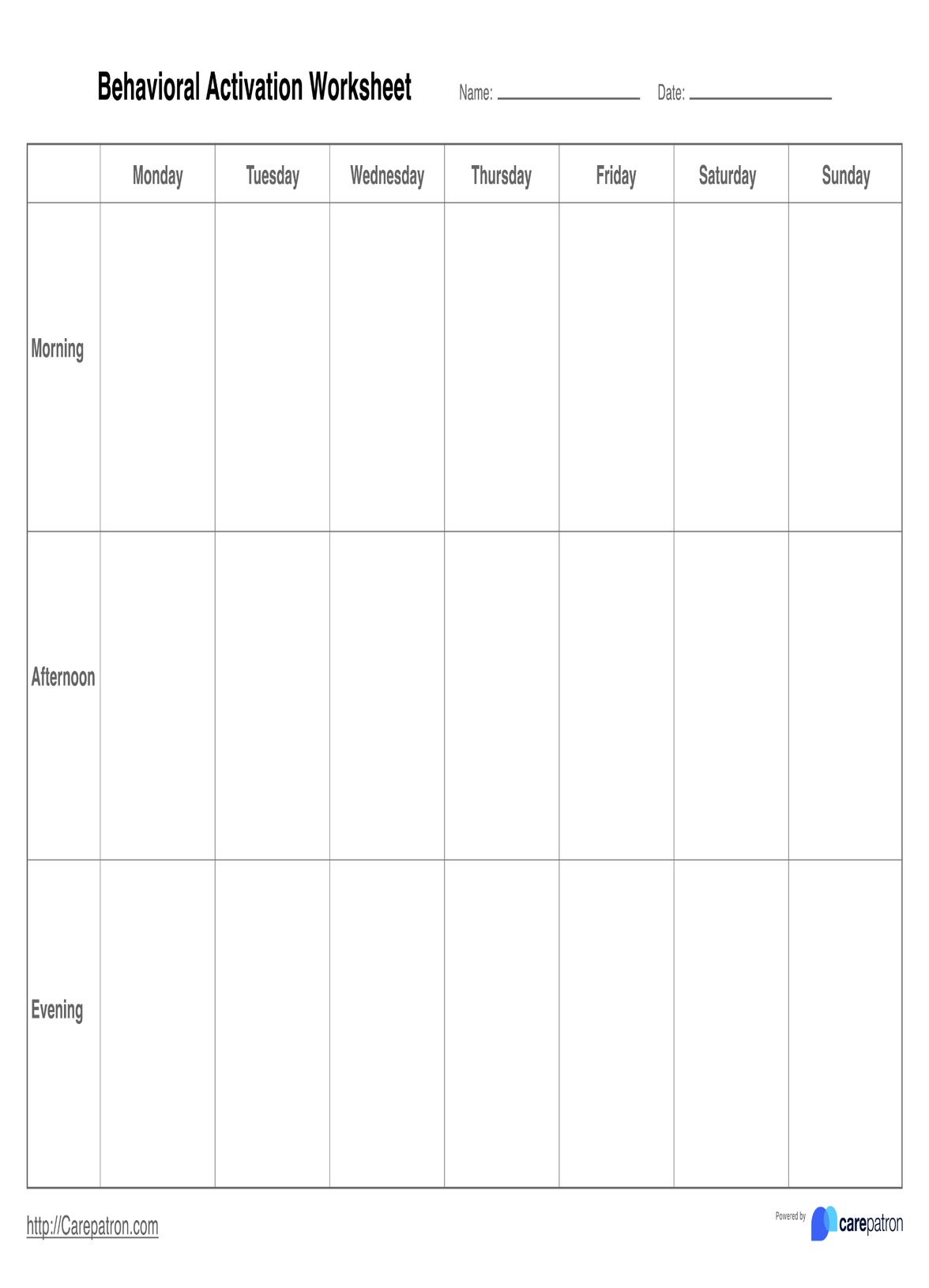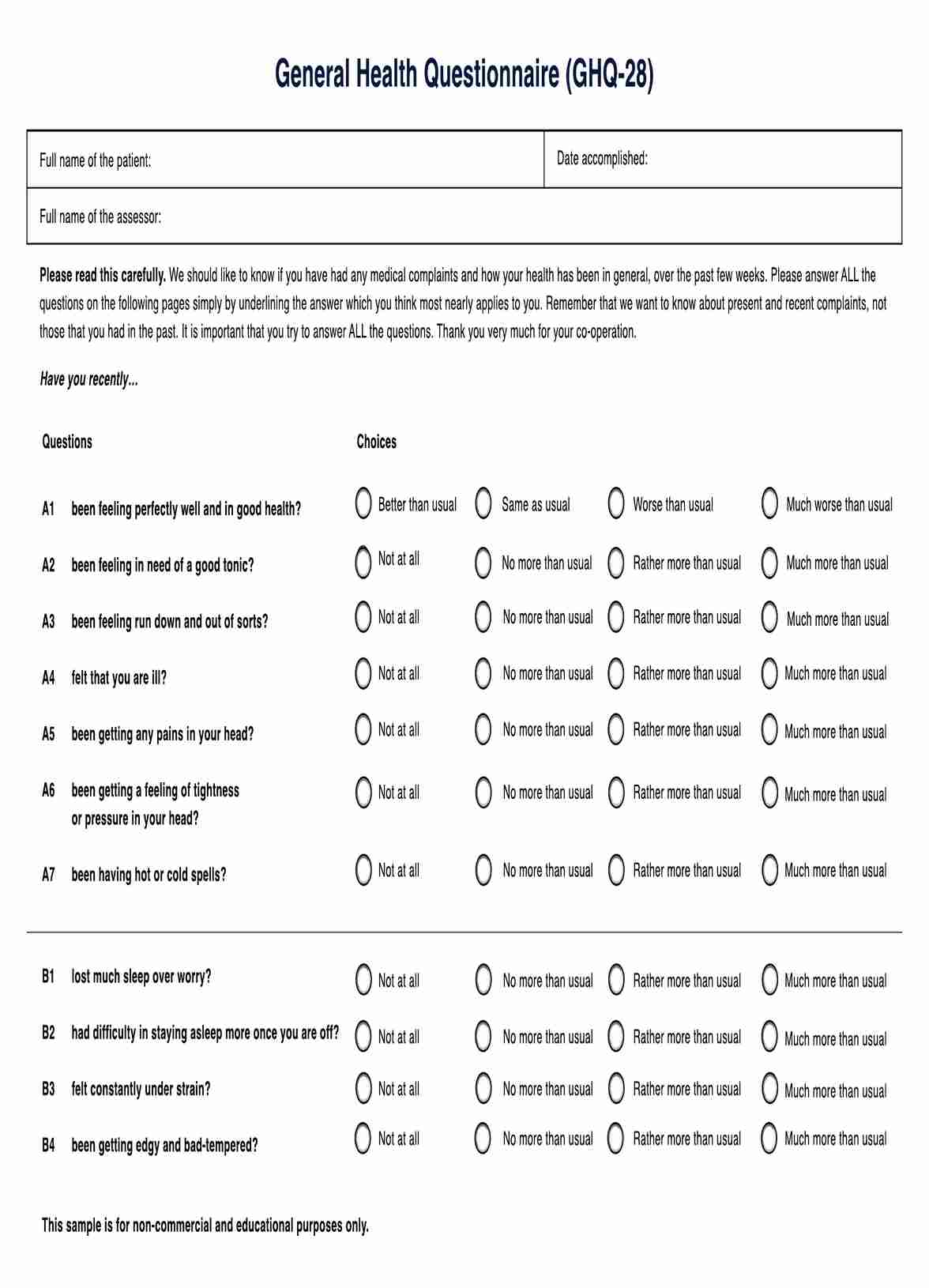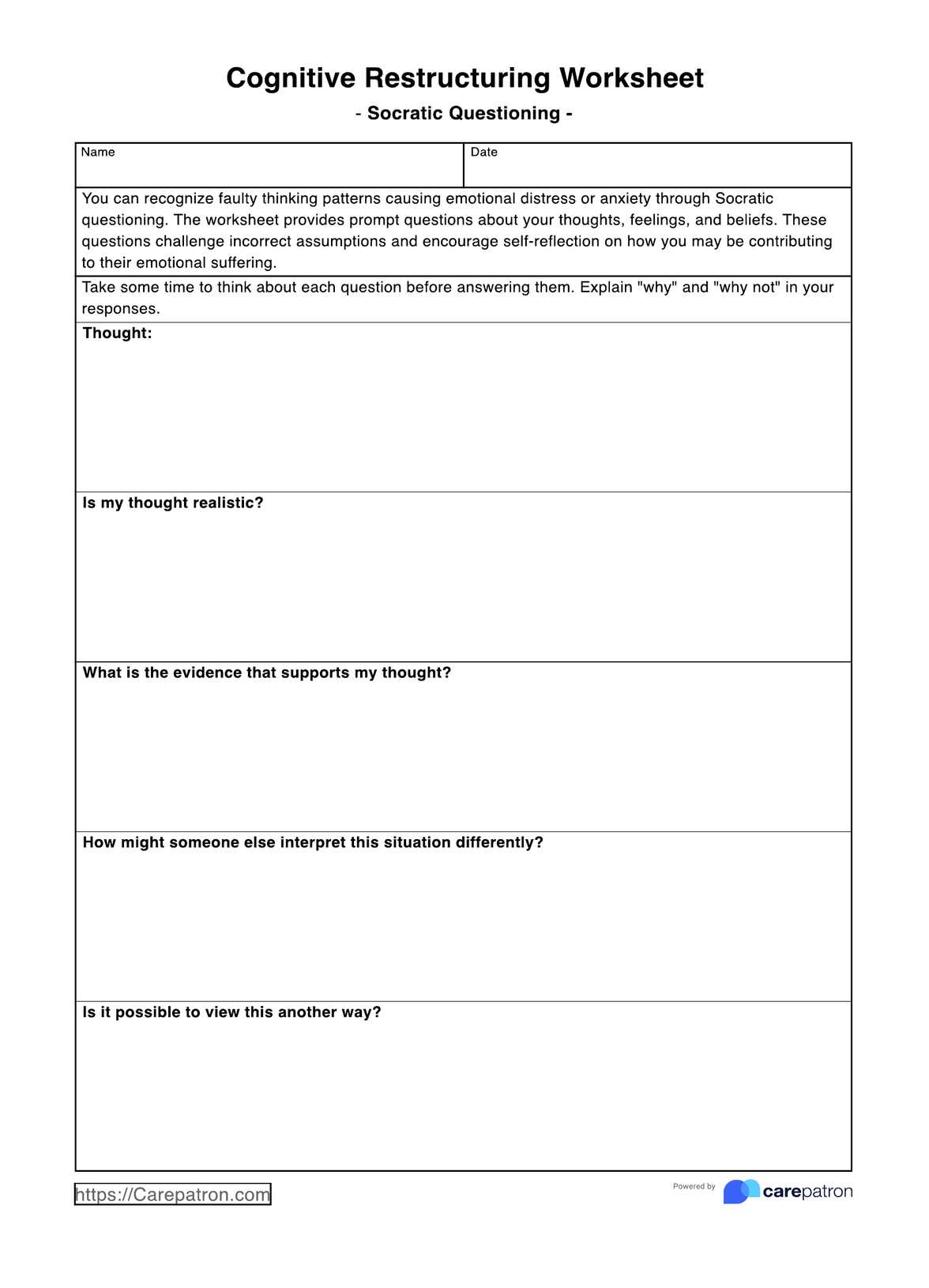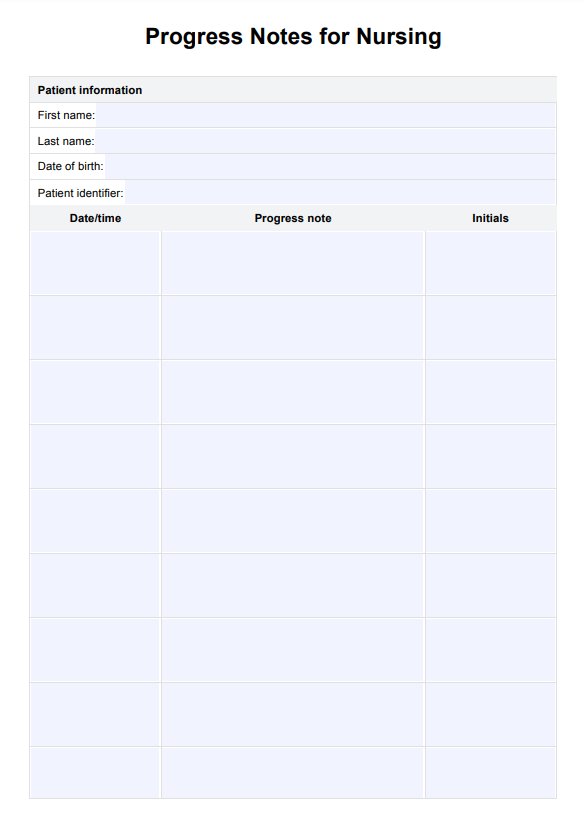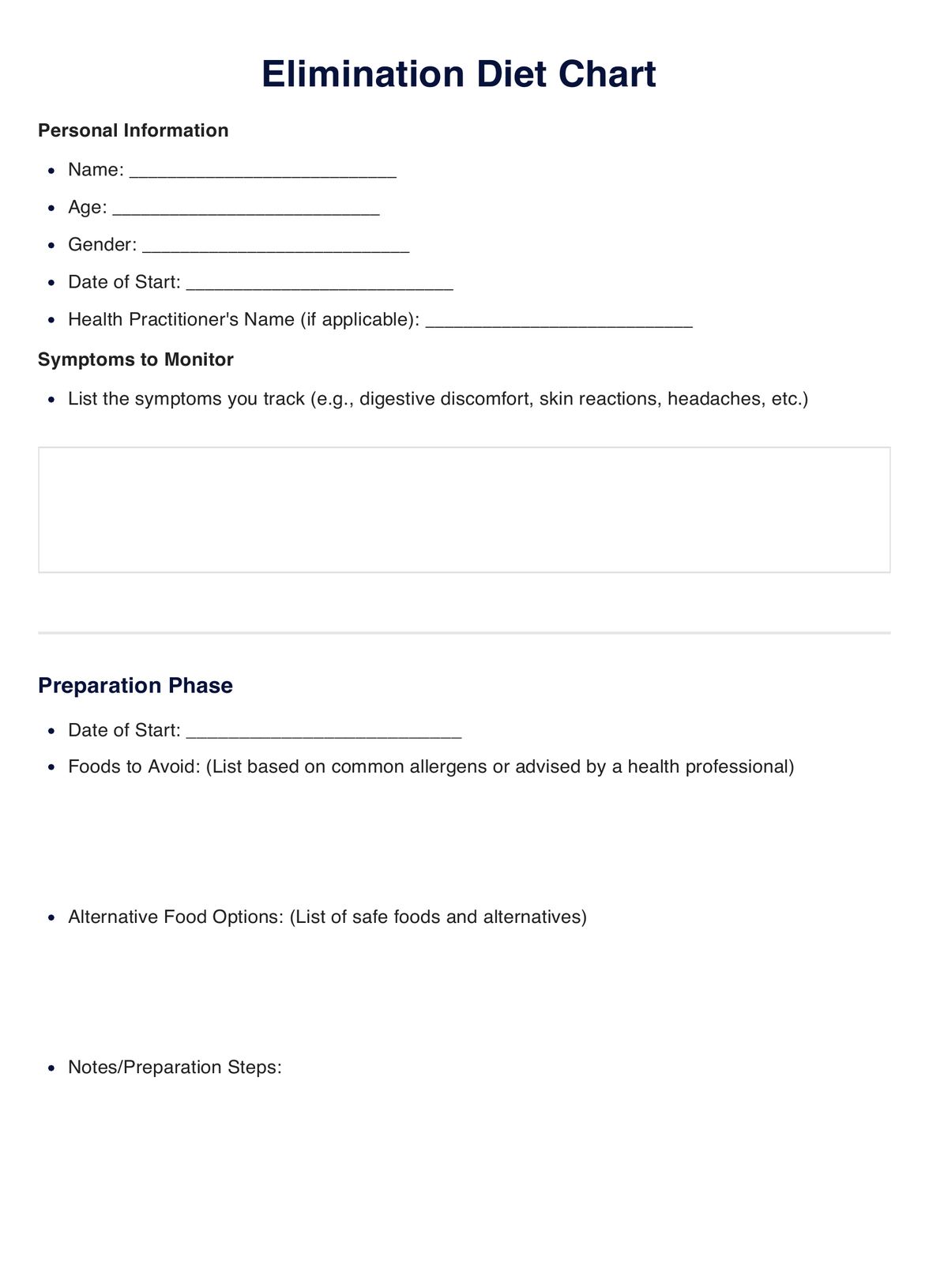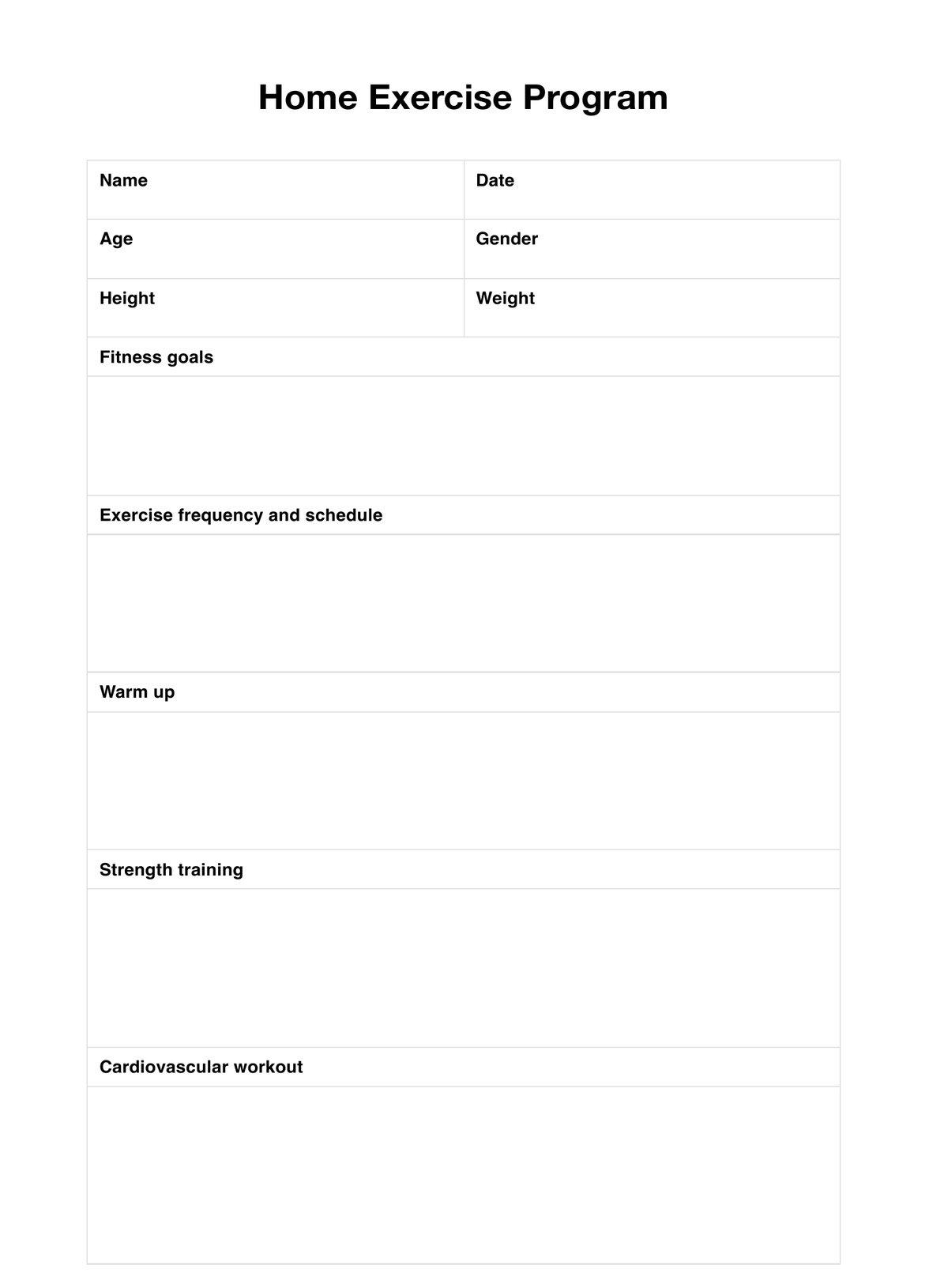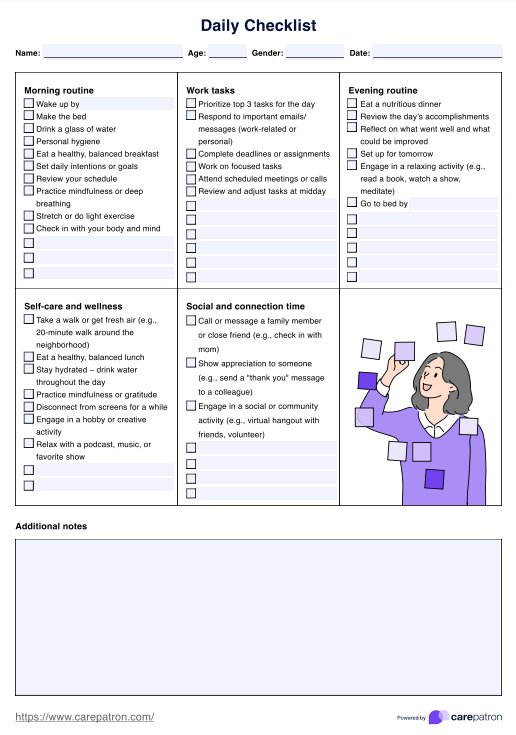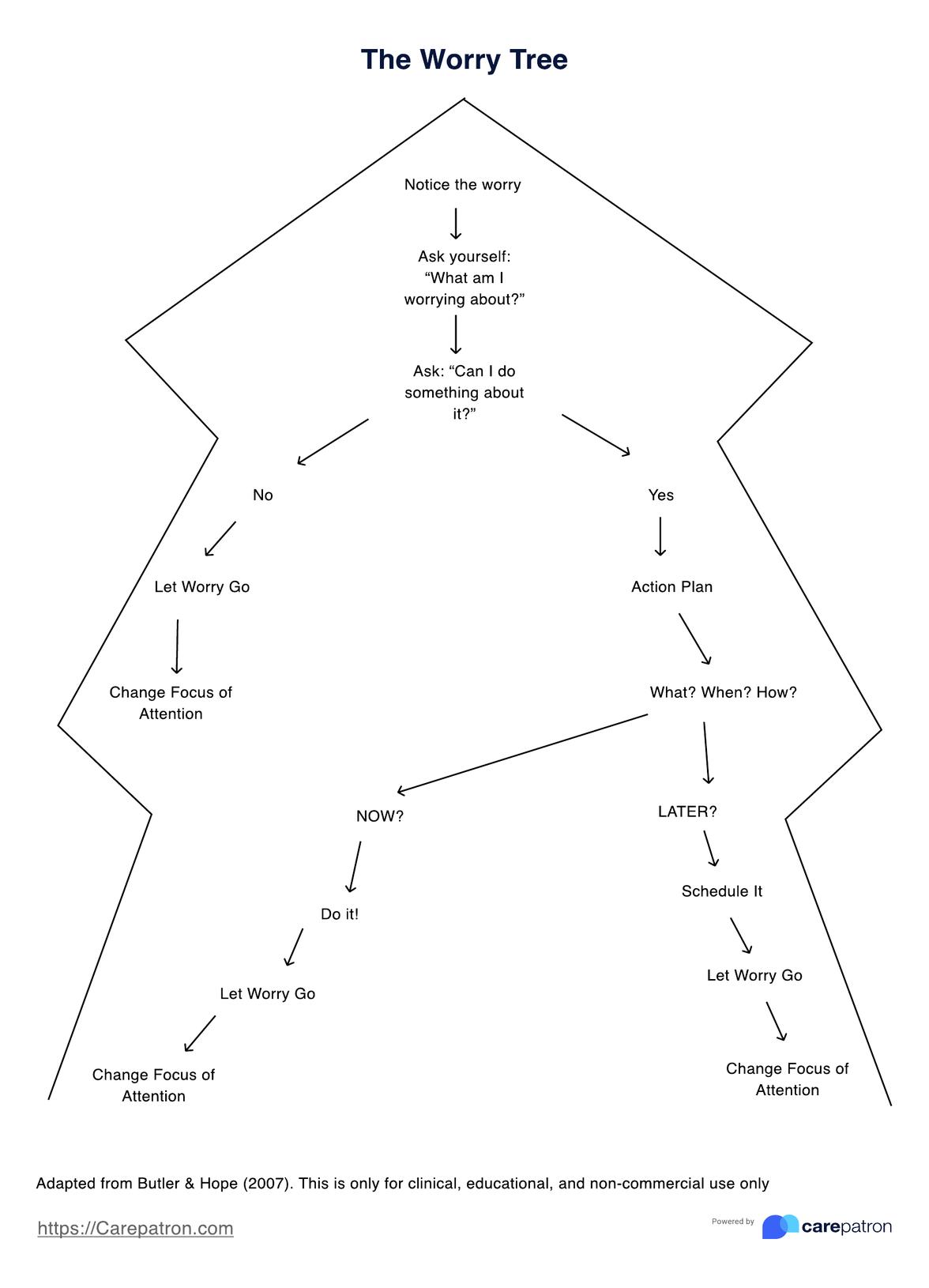Motivational Interviewing Example Script
Download a free Motivational Interviewing Script PDF with an example to enhance clinical communication and effectively support patient motivation and change.


What are motivational interviews?
Motivational interviewing is a client-centered counseling method used to engage patients in conversations that support positive behavioral change (Substance Abuse and Mental Health Services Administration, 2021). Originally developed by William Miller and Stephen Rollnick for substance abuse treatment (Smedslund et. al., 2011), the motivational interviewing process is now widely applied in managing various psychological and physical health conditions. This approach helps clients resolve ambivalence about change by encouraging open dialogue and evoking internal motivation.
Central to motivational interviewing strategies are techniques like active listening and the use of open-ended questions, affirmations, and summaries (Bischof et. al., 2021). These tools promote change talk, where clients verbalize their motivations in their own words, strengthening their commitment to change. The motivational interviewing approach is collaborative, emphasizing the client’s autonomy and self-direction.
Practitioners focus on the emotional aspects of behavior and foster the client’s self-efficacy to promote sustainable positive behaviors. Motivational interviewing works by building trust, validating client experiences, and guiding them toward healthier decisions without imposing external pressure.
Motivational Interviewing Example Script Template
Motivational Interviewing Example Script Example
5 principles of motivational interviewing
Healthcare professionals using motivational interviewing rely on core principles to guide client-centered conversations (Glynn & Moyers, 2009). These principles help establish a strong therapeutic relationship and improve outcomes by encouraging individuals to explore and commit to positive change.
Express empathy
Expressing empathy means actively listening to the client and communicating an understanding of their feelings and perspectives. Reflective listening and phrases like “It sounds like…” help build trust and a supportive relationship (Braillon & Taiebi, 2020). This step is extremely important in the early stages of the motivational interviewing process, as it encourages openness.
Develop discrepancy
Developing discrepancy involves helping clients see the gap between their current situation and their desired future (Okumu, 2021). This technique encourages clients to reflect on the differences between their behaviors and their values or goals. Practitioners can help clients recognize this internal conflict by using the following examples or summary statements. The “curious paradox” is that by seeing the discrepancy clearly, clients are more likely to move toward change.
Avoid argument (or roll with resistance)
Instead of confronting resistance directly, healthcare professionals should “roll with it” by recognizing the person’s concerns without judgment or correction. This approach respects one’s ability to decide when and how to change. Statements like “You’re not sure this is the right time” keep the communication open. Avoiding argument reduces defensiveness and strengthens the relationship.
Support self-efficacy
Supporting self-efficacy means helping clients believe in their ability to change. This is achieved by highlighting personal strengths, reflecting on past successes, and reinforcing their capacity to succeed (Australian Institute of Professional Counsellors, 2015). In the context of motivational interviewing, this principle is extremely important, as confidence is closely tied to actual outcomes. Encouragement and genuine interest in one’s ability empower clients to move toward their change goals.
Develop autonomy (or evocation)
Developing autonomy means recognizing that the client, not the healthcare provider, is responsible for making changes (Entwistle et al., 2010). This principle respects people’s freedom to choose and decide what’s best for themselves. The practitioner’s role is to offer assistance, ask thoughtful questions, and evoke the client’s own motivations. Statements like “What’s the most important thing to you right now?” invite self-reflection.
What is a Motivational Interviewing Script?
A Motivational Interviewing Script is a structured tool used by healthcare professionals to guide conversations that support behavioral change. It follows the motivational interviewing approach, which is an evidence-based approach designed to help clients assess the importance of change and the risk of maintaining current behaviors.
This script helps practitioners maintain focus while promoting client autonomy and encouraging reflection on goals, values, and consequences. It typically includes prompts and techniques such as open-ended questions, affirmations, and reflections to explore decisional balance—evaluating pros and cons of change.
How does it work?
Carepatron’s Motivational Interviewing Script is designed for seamless integration into clinical workflows. The following steps explain how to access, apply, and maximize the script throughout the care process.
Step 1: Access the script template
Click the “Use template” button on this page to get started. This will allow you to access a customizable file within the Carepatron platform that you can edit before printing or digital use. You can also click "Download" to get a PDF copy of the file.
Step 2: Use the script in patient assessment
During patient assessments, open the script template and use it to guide your initial conversation. The structured prompts help you explore the patient’s current behaviors, motivations, and readiness to change while maintaining a non-confrontational, patient-centered tone.
Step 3: Conduct an interview with the patient
Follow the Motivational Interviewing Script to ask open-ended questions, use reflective listening, and encourage change talk. The script can help you respond empathetically, summarize key points, and facilitate decision-making throughout the interview process.
Step 4: Provide additional patient support and next steps
After the interview, review key insights and collaborate with the patient on next steps. Use the script to document discussions, offer appropriate follow-ups, and connect patients with additional resources or services. This ensures continuity of care and reinforces the motivation for long-term behavioral change.
Benefits of using this script
Using the Motivational Interviewing Script example streamlines clinical communication and improves the efficiency of behavior change discussions. For healthcare professionals, this tool provides a consistent framework that supports goal-oriented, empathetic conversations without requiring excessive preparation or improvisation. It enhances the quality of patient assessments by prompting reflective questions, facilitating structured responses, and encouraging effective documentation. This consistency leads to better engagement and more actionable insights during appointments.
The script also helps reduce variability across practitioners by offering standardized prompts that align with evidence-based motivational interviewing techniques. It supports time management by keeping conversations focused while still respecting patient autonomy. Additionally, it reduces cognitive load during busy clinical hours, allowing practitioners to focus more on listening and responding meaningfully.
References
Australian Institute of Professional Counsellors. (2015, January 12). Principles and techniques of motivational interviewing. AIPC Article Library. https://www.aipc.net.au/articles/principles-and-techniques-of-motivational-interviewing/
Bischof, G., Bischof, A., & Rumpf, H.-J. (2021). Motivational interviewing: An evidence-based approach for use in medical practice. Deutsches Ärzteblatt Online, 118(7), 109–115. https://doi.org/10.3238/arztebl.m2021.0014
Braillon, A., & Taiebi, F. (2020). Practicing “reflective listening” is a mandatory prerequisite for empathy. Patient Education and Counseling, 103(9), 1866–1867. https://doi.org/10.1016/j.pec.2020.03.024
Entwistle, V. A., Carter, S. M., Cribb, A., & McCaffery, K. (2010). Supporting patient autonomy: The importance of clinician-patient relationships. Journal of General Internal Medicine, 25(7), 741–745. https://doi.org/10.1007/s11606-010-1292-z
Glynn, L. H., & Moyers, T. B. (2009). Motivational interviewing for addictions. In P. M. Miller (Ed.), Evidence-based addiction treatment (pp. 175–188). Academic Press. https://doi.org/10.1016/b978-0-12-374348-0.00009-4
Okumu, E. (2021, December 22). Conversations about change: Developing discrepancy. UNC Center for AIDS Research. https://www.med.unc.edu/cfar/2021/12/conversations-about-change-developing-discrepancy/
Smedslund, G., Berg, R. C., Hammerstrøm, K. T., Steiro, A., Leiknes, K. A., Dahl, H. M., & Karlsen, K. (2011). Motivational interviewing for substance abuse. Cochrane Database of Systematic Reviews, 2011(5), Article CD008063. https://doi.org/10.1002/14651858.cd008063.pub2
Substance Abuse and Mental Health Services Administration. (2021). Motivational interviewing as a counseling style. https://www.ncbi.nlm.nih.gov/books/NBK571068/
Commonly asked questions
In motivational interviewing, use open-ended questions, affirmations, reflective listening, and summary statements to guide the conversation and support behavior change. The focus is on encouraging the client to explore their motivations in their own words without judgment or pressure.
The five core principles are: express empathy, develop discrepancy, avoid argument (or roll with resistance), support self-efficacy, and develop autonomy (or evocation). These principles guide healthcare professionals in building a collaborative, respectful relationship that promotes positive behavioral change.
Common motivational interviewing phrases include “It sounds like…”, “What are your thoughts on that?”, “How does that fit with your goals?”, and “What would change look like for you?”. These phrases encourage reflection, highlight personal values, and support self-directed decision-making.
Effective questions include: “What are some things you’d like to change?”, “What concerns do you have about your current habits?”, “How confident do you feel about making this change?”, and “What’s the most important thing to you right now?”. These help elicit change talk and clarify readiness.


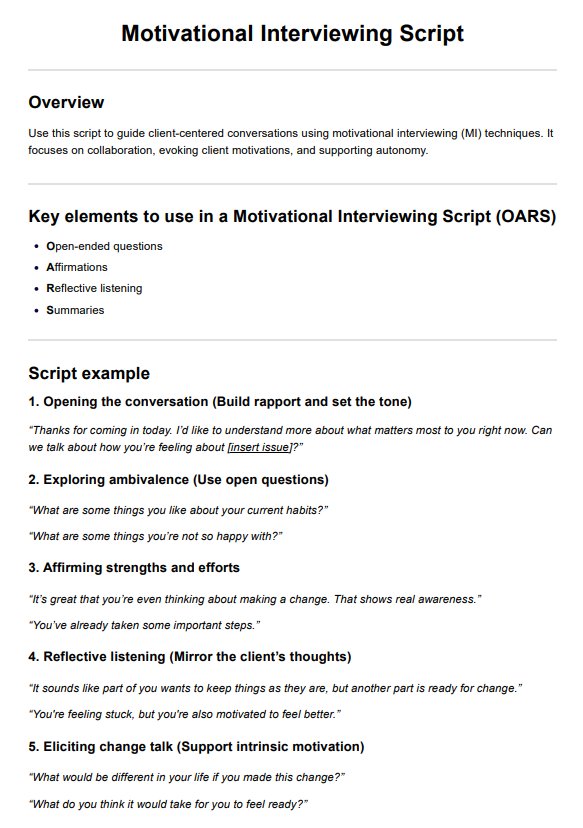
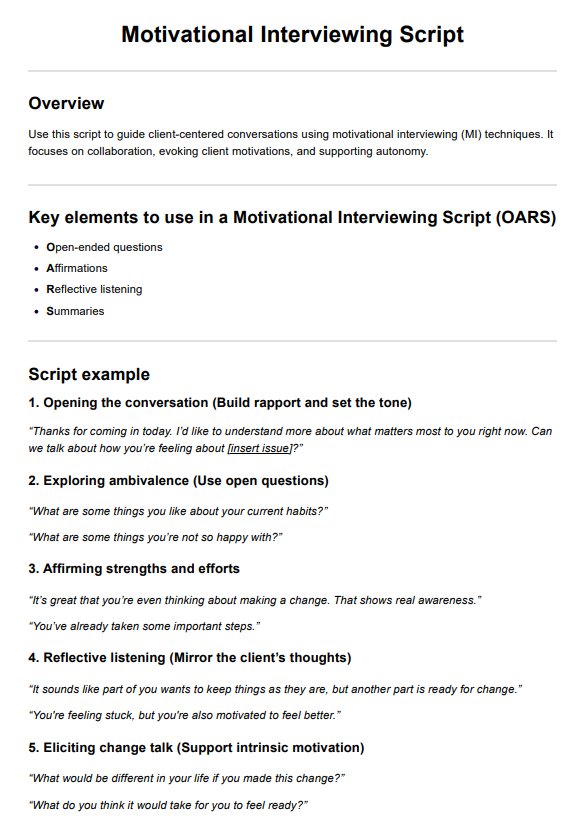

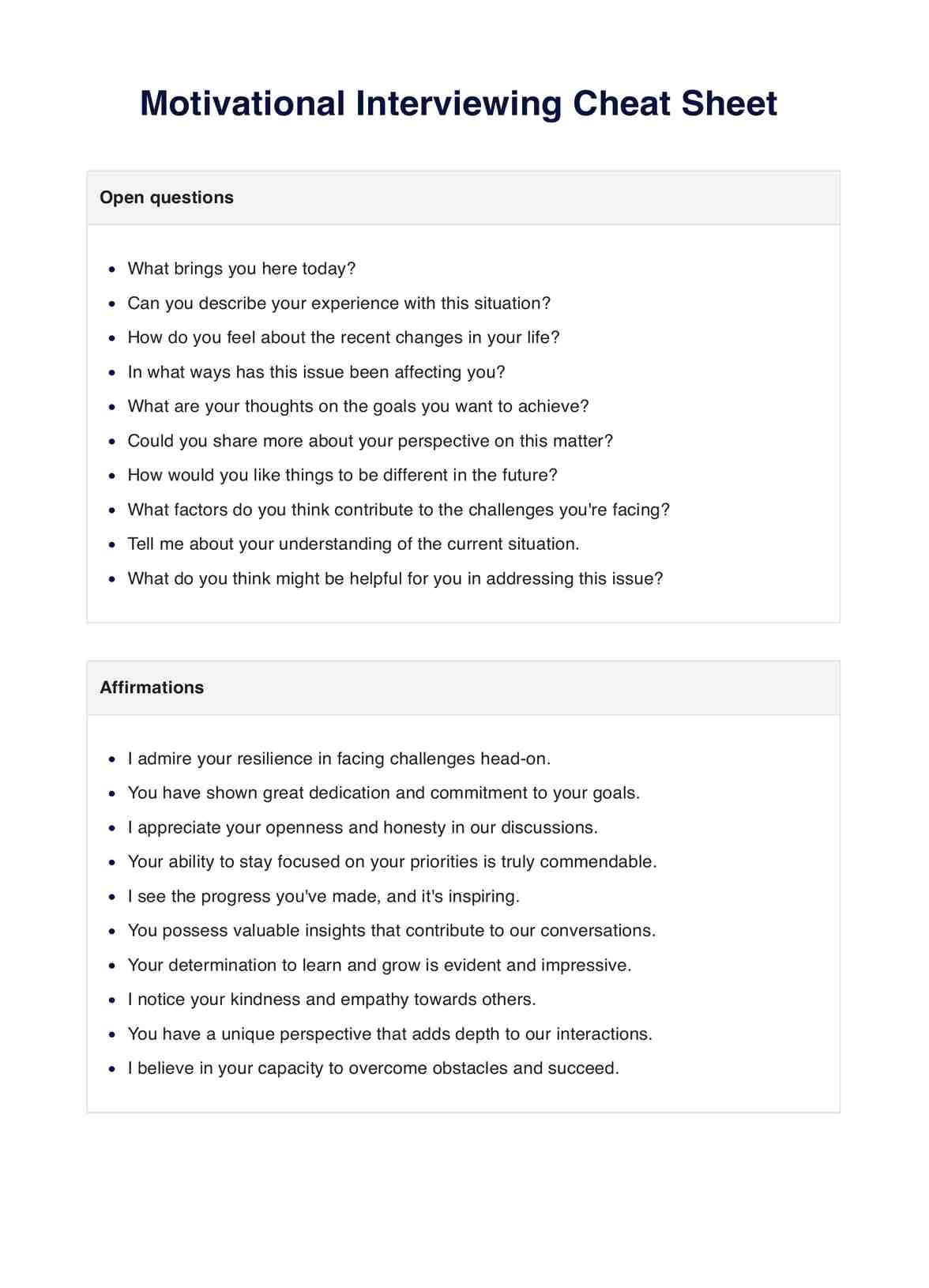
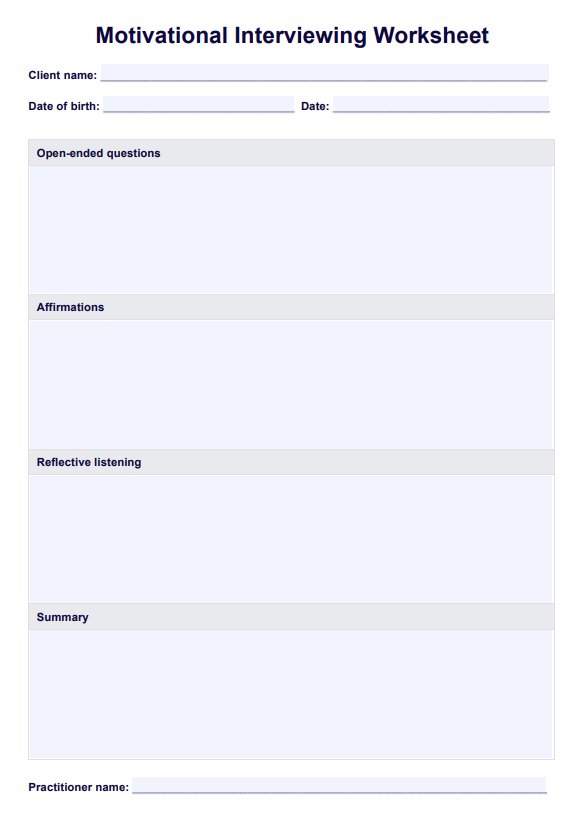















-template.jpg)




















































































